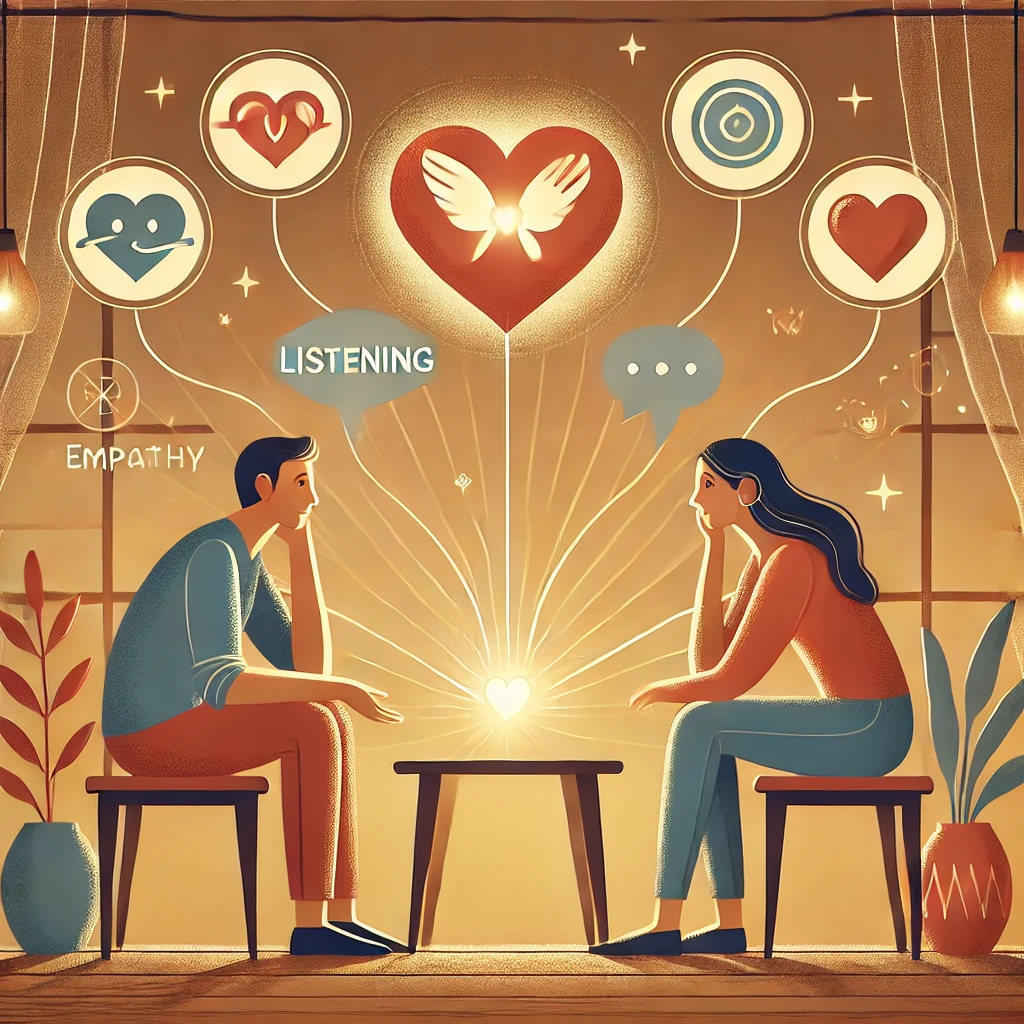In today’s fast-moving world filled with constant distractions, the simple act of listening has become less common. Real listening—based on empathy and understanding—can change relationships, close gaps, and create true connections. Being good at listening is more than just a skill; it is an act of care and respect that can improve both personal and work relationships.
1. Why Listening Matters
A. Strengthening Relationships
- Foundation of Trust: When you listen carefully, others feel their thoughts and feelings are important, which builds trust.
- Emotional Support: Being listened to can reduce stress and provide comfort, making emotional connections stronger.
B. Resolving Conflicts
- Understanding Perspectives: Listening helps you find the real reasons behind disagreements, making it easier to resolve them.
- Reducing Miscommunication: By listening actively, you reduce misunderstandings and prevent conflicts.
C. Personal Growth
- Broader Perspectives: Listening to others helps you understand different viewpoints and fosters empathy.
- Improved Communication: It enhances your ability to express your thoughts and respond thoughtfully.
2. The Difference Between Hearing and Listening
Hearing is simply the act of perceiving sound, while listening is an active process that involves focus, understanding, and empathy.
Key Aspects of Active Listening:
- Presence: Fully engaging in the conversation.
- Understanding: Trying to grasp the speaker’s message and emotions.
- Feedback: Showing that you understand by responding appropriately.
3. The Role of Empathy in Listening
Empathy means understanding and sharing another person’s feelings. When combined with active listening, empathy turns conversations into meaningful exchanges.
A. Cognitive Empathy
- Understanding another person’s perspective without sharing their feelings.
B. Emotional Empathy
- Sharing and resonating with another person’s emotions, creating a deeper bond.
C. Compassionate Empathy
- Combining understanding and shared feelings with a desire to help.
4. Techniques for Mastering the Art of Listening
A. Practice Mindful Listening
- Be Present: Focus only on the speaker.
- Eliminate Distractions: Turn off notifications and find a quiet place.
- Maintain Eye Contact: Show engagement.
B. Use Nonverbal Cues
- Nods and Facial Expressions: Show understanding and interest.
- Open Body Language: Avoid crossed arms or defensive postures to encourage openness.
C. Ask Open-Ended Questions
- Examples:
- “Can you tell me more about that?”
- “How did that make you feel?”
- Purpose: Encourage the speaker to elaborate and feel heard.
D. Reflect and Summarize
- Paraphrase what the speaker has said to ensure understanding.
- Example: “So, you’re saying that you felt overwhelmed during the meeting?”
E. Avoid Interrupting
- Let the speaker finish their thoughts without interjecting.
- Silence can allow for deeper reflection.
F. Validate Feelings
- Acknowledge the speaker’s emotions without judgment.
- Example: “I can see why that situation would make you feel frustrated.”
5. Overcoming Barriers to Effective Listening
A. Prejudgments
- Don’t form opinions or assumptions before hearing the full message.
- Approach each conversation with an open mind.
B. Personal Bias
- Recognize and set aside biases that might affect your interpretation of the speaker’s words.
C. Emotional Triggers
- Stay calm and composed, even if the conversation evokes strong emotions.
D. Distractions
- Resist the urge to check your phone or let your mind wander.
6. Benefits of Listening with Empathy
A. Deeper Personal Relationships
- Empathetic listening builds trust and intimacy, making relationships more meaningful. Stronger Professional Connections
Active listening can significantly improve teamwork, leadership abilities, and customer interactions. Showing empathy contributes to a more cooperative work environment.
Enhanced Conflict Resolution
When you understand different viewpoints, it becomes easier to find solutions that everyone can agree on.
Emotional Healing
People feel valued and understood when they are truly listened to, aiding them in processing their emotions.
Real-Life Applications of Empathetic Listening
In Friendships
Be the kind of friend who listens without passing judgment, creating a safe space for openness.
In Romantic Relationships
Have meaningful conversations with your partner to understand their needs and feelings better.
In the Workplace
Empathetic listening can help build stronger relationships with colleagues, manage disputes, and improve leadership.
In Parenting
Listen to your children with empathy and patience, which helps boost their confidence and emotional intelligence.
Building a Culture of Listening
Encourage Open Communication
Foster environments where people feel at ease sharing their thoughts and emotions.
Lead by Example
Show active listening in your interactions to motivate others to do the same.
Provide Training
Organize workshops or offer resources on active listening and empathy for teams and organizations.
The Long-Term Impact of Listening
Personal Transformation
Better relationships contribute to greater happiness and emotional well-being. Listening also enhances self-awareness and supports a growth mindset.
Societal Benefits
Empathetic listening fosters understanding, reduces conflict, and helps build stronger communities.
Conclusion
The skill of listening, enhanced by empathy, is essential for creating deeper and more meaningful relationships. It involves a genuine effort to understand and appreciate others, going beyond mere words. In a world that often values speaking over listening, mastering this skill can set you apart. It will make you a better friend, partner, colleague, and leader. Embrace the art of listening, and watch it transform your interactions and enrich your life.




